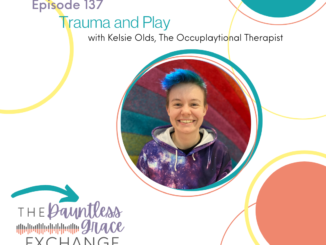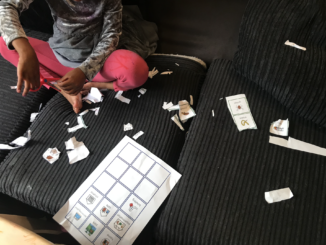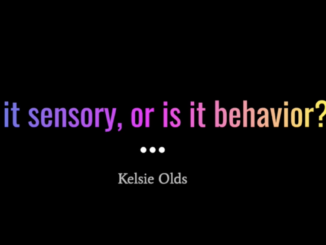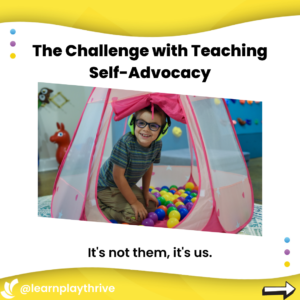
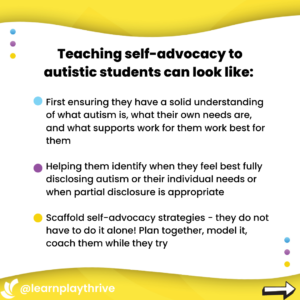
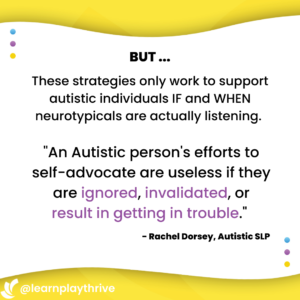
[Image descriptions: The first image has a title, “The Challenge with Teaching Self-Advocacy…It’s not them, it’s us.” over the top of an image of a child playing in a pink play tent filled with colorful balls while wearing bright green noise cancelling headphones.
The second image reads, “Teaching self-advocacy to autistic students can look like:
-First ensuring they have a solid understanding of what autism is, what their own needs are, and what supports work best for them.
-Helping them identify when they feel best fully disclosing autism or their individual needs, or when partial disclosure is appropriate.
-Scaffold self-advocacy strategies — they do not have to do it alone!
Plan together, model it, coach them while they try.”
The third image reads “But…these strategies only work to support autistic individuals IF and WHEN neurotypicals are actually listening.
‘An Autistic person’s efforts to self-advocate are useless if they are ignored, invalidated, or result in getting in trouble.’ -Rachel Dorsey, Autistic SLP”
The images were made by Learn Play Thrive whose handle is on each of the images, in white text over a yellow wavy graphic. End descriptions.]
***
This is what I mean when I say that I get 4yos on my caseload whose IEP goals make it clear that their adults want me to override their self-advocacy all day long, and then those children end up as the 12yos on my caseload whose adults can’t figure out why they won’t advocate for themself.
Because when they were 4 and they hated the way something made them feel, they screamed about it, and their adults said “They’re screaming for no reason” and forcibly exposed them to the problem for days and years on end until they gave up and turned their screaming inward — into self-harming stims, or daydreaming as a form of escapism, or holding it all in until they explode when they go home.
Because when they were 5 and being required to do tasks that were developmentally inappropriate and too hard, and they giggled and wiggled and avoided the task, their adults said “They’re being silly and inattentive and avoidant” and implemented behavior charts and interventions until they internalized the message that it was a moral failure on their own part, for not trying to do things that their body couldn’t do and that weren’t interesting.
And in a blink — they are 12 — and they know that their job is to sit quietly and *look* busy. That doesn’t mean they can do the work. That doesn’t mean they even understand what the work is. And if something or someone is hurting them, they may or may not even tell you. And their adults say “It’s like they don’t even know what ‘help’ means, or how to ask for it.”
Because they were screaming it, with their behavior, when they were small. And they were ignored or punished when they did. They don’t know what “help” means anymore. They know it doesn’t come from those adults.

